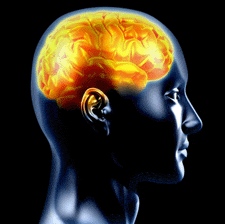Major depression (major depressive disorder) is a severe condition that centers on an inability to properly regulate mood and emotion. For a long time, doctors and scientists have believed that the condition produces its effects by altering the normal function of several areas of the brain. However, according to the results of a study published in 2012 in the journal PLOS ONE, the problem is not simply altered activity in separate brain regions. Instead, depressed people apparently lose the ability to control the rate of communication between different regions and essentially develop “hyperactive” brains.
Major Depression Basics
Major depression gets its name because of the seriousness of its effects. People with the disorder experience potentially debilitating problems with mood control as well as the regulation of emotional states such as sadness, guilt, helplessness and hopelessness. While all of these emotions naturally play a role in everyday life, the inability to control their presence can drastically reduce a person’s quality of life and participation in a fulfilling daily routine. The effects of major depression aren’t limited to issues of mood and emotion. Other well-known symptoms of the disorder include appetite alterations, altered sleeping patterns, disordered thought processes, loss of physical energy, a decline in the capacity for pleasure, headaches and other physical complaints, a fixation with death or dying, suicidal thoughts and suicidal behaviors. The specific mixture of these symptoms varies from person to person.
Emotional Processing Basics
Three brain regions play a prominent role in producing depressed emotional states, the authors of a 2011 report from Harvard Medical School explain. Under normal circumstances, these regions perform such basic tasks as regulating strong emotions, regulating sexual drive, coordinating emotional states with the brain’s centers for logic and reasoning, and coordinating the interaction between emotion and memory. In a healthy person unaffected by depression, the brain controls its overall emotional state by controlling the amount of chemical and electrical communication that takes place between the regions in question. When a given individual goes through an emotion-producing event or situation, increased activity occurs in the pathways that link the regions together, and this activation triggers the formation of an appropriate response. When the event or situation ends, those pathways deactivate and the rate of communication drops back down to its baseline level.
Brain Hyperactivity
In the study published in “PLOS ONE,” researchers from UCLA used modern brain mapping technology to examine the rate of activity in the brains of in 121 adults who had received a previous diagnosis for major depression. Specifically, they looked at the strength of the electrical signals sent between the brain regions that play a role in depression. After reviewing their findings, the authors of the study concluded that people affected by major depression don’t experience the normal drop in signal strength that occurs when emotional pathways in the brain deactivate. Instead, their pathways stay abnormally activated and enter a state of significant hyperactivity. The study’s authors also concluded that this hyperactivity affects communications networks throughout the brain and not just the pathways associated with emotional processing. In addition to losing control of normal electrical signaling, the brain also apparently loses part of its ability to regulate its production of several vital mood-stabilizing chemicals. Loss of the ability to properly control the brain’s communications networks and mood-stabilizing chemicals has widespread effects. In addition to loss of the normal regulation of emotional states, affected individuals develop several other symptoms classically associated with major depression, including a decline in the ability to take in new information and a decline in the ability to use information appropriately for problem-solving and other higher-level mental functions.
Considerations
The authors of the study in PLOS ONE believe that they are the first researchers to identify the presence of signal hyperactivity in the brains of people affected by major depression. They also believe that their findings may lead to some basic changes in the ways that mental health professionals look at both depression and depression treatment. For instance, doctors and researchers have long believed that antidepressant medicationsBrain ‘hyperconnectivity’ linked to depression achieve their primary effects by restoring appropriate levels of mood-regulating chemicals inside the brain. However, the study’s results indicate that antidepressant medications may actually achieve their main effects by allowing the brain to restore its normal control over its electrical networks, and thereby prevent episodes of electrical hyperactivity.

